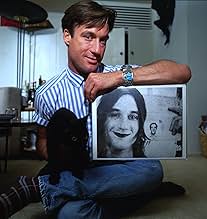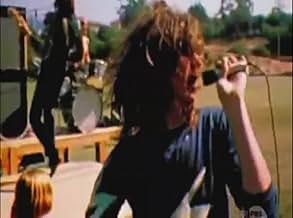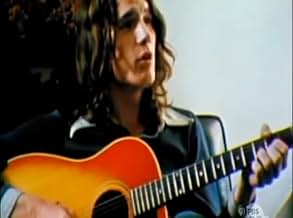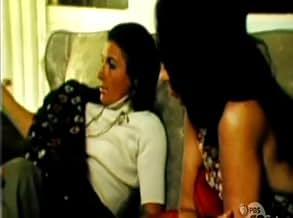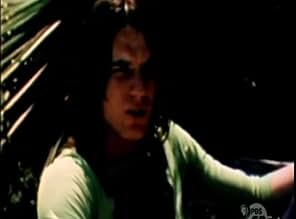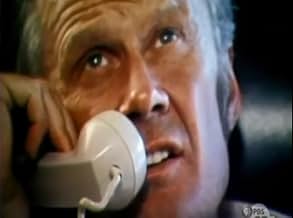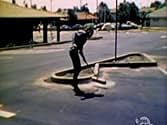Aggiungi una trama nella tua linguaFollows the real lives of the Loud family, a motley group of suburbanites.Follows the real lives of the Loud family, a motley group of suburbanites.Follows the real lives of the Loud family, a motley group of suburbanites.
Sfoglia gli episodi
Recensioni in evidenza
While channel-surfing last night I came across what appeared to be an old, fuzzy color film of a drag queen review on Public TV last night. Intrigued, I looked it up and discovered it was an episode of the old pioneering reality series "An American Family," something I had completely forgotten for the last 30 years. This was the episode where Pat Loud goes to New York to visit with her son Lance, who was openly gay and living beyond his means at the Chelsea Hotel amongst other arty young gay men. This must have been pretty shocking stuff for the early 1970s. I really knew nothing about Lance, but listening to his very young self rambling incoherently about what he wanted out of life, I felt a bit sad for him, and on searching the Internet the next day I found out that he had died from complications of AIDS in 2001. He lived a colorful life that was not without success (punk band front man, journalist), but back then in the 1970s he looked to me like one sad, confused kid.
I still recall the media hype surrounding this series, and watching the premier back in 1973 when it first aired. What struck me most about this California family then was their considerable affluence, so foreign to my own life experience. I remember seeing a report, aired some time after the series had run, in which Corporate executive Bill Loud (the father) complained about the effect it had on the life of his family, and how his co-workers regarded him. That "Lance in New York" episode certainly must have given those old-fashioned corporate guys a good chuckle. But the report also spoke to the vehement class hatred which the series had unexpectedly stirred up. Letters sent to the Loud family contained threatening statements like "you'd better watch out for your kids," and so on. I can, in fact, vividly recall the Loud siblings being introduced one by one in that premier episode, and the shout of disdain my mother issued when the youngest son was shown noisily practicing his trombone in his bedroom. Why that disdain for such an innocent activity? Well, if you've spent your entire life living in cramped urban apartments, you know that you can't let your child learn the friggin' trombone at home (assuming you can buy the damned thing for him in the first place), unless you want to risk eviction. Envy? Yeah, sure, but sometimes it gets the better of you. Class hatred in this country seems likely be exacerbated in the next few years by both the major political parties. Some things never change.
This New York episode was certainly a fascinating time capsule of the late hippie era. I wonder if you can still climb to the top of a fountain in the park (as someone was shown doing in this episode) without getting arrested in what is still pretty much Giuliani's New York?
I still recall the media hype surrounding this series, and watching the premier back in 1973 when it first aired. What struck me most about this California family then was their considerable affluence, so foreign to my own life experience. I remember seeing a report, aired some time after the series had run, in which Corporate executive Bill Loud (the father) complained about the effect it had on the life of his family, and how his co-workers regarded him. That "Lance in New York" episode certainly must have given those old-fashioned corporate guys a good chuckle. But the report also spoke to the vehement class hatred which the series had unexpectedly stirred up. Letters sent to the Loud family contained threatening statements like "you'd better watch out for your kids," and so on. I can, in fact, vividly recall the Loud siblings being introduced one by one in that premier episode, and the shout of disdain my mother issued when the youngest son was shown noisily practicing his trombone in his bedroom. Why that disdain for such an innocent activity? Well, if you've spent your entire life living in cramped urban apartments, you know that you can't let your child learn the friggin' trombone at home (assuming you can buy the damned thing for him in the first place), unless you want to risk eviction. Envy? Yeah, sure, but sometimes it gets the better of you. Class hatred in this country seems likely be exacerbated in the next few years by both the major political parties. Some things never change.
This New York episode was certainly a fascinating time capsule of the late hippie era. I wonder if you can still climb to the top of a fountain in the park (as someone was shown doing in this episode) without getting arrested in what is still pretty much Giuliani's New York?
I happened to stumble across An American Family one day, and I thought it was really fascinating. Before seeing this, I had no idea camera crews filming people's unscripted interactions existed prior to the early 2000s, so this is technically the first reality show. Who would've thought it'd turn out to be this moneymaking, human exploitation, manufactured drama of a machine that it is. People nowadays love to escape from their issues by pointing and laughing at the misfortunes of others, whether it's a person who loves to hoard all kinds of junk, litigants arguing in small claims court, or amateur cooks getting yelled and screamed at by a world class chef. I think judging and criticizing individuals with various problems gives folks comfort in a way, because it makes them feel like "well at least my life isn't that bad!" Reality television has led to society becoming increasingly hypocritical. An American Family is quite mild compared to the nastiness and backstabbing that's on our screens in this day and time but it was more or less a precursor of what was to come.
During the early 70s, people tuning into PBS were treated to the daily conversations and activities of the Louds, a family living in Santa Barbara. Bill and Pat were parents to 5 children - Michelle, Delilah, Grant, Kevin, and Lance - who ranged in age from mid to late teens. The issues and arguments they had are pretty much the same to what parents and teenagers are having/dealing with in the current time, so that is intriguing in a sense, to see how generations have similar challenges, but otherwise, just like reality TV now, it reaches a point where it gets incredibly boring to just watch people talking to each other. The Louds really aren't interesting or unique. Many of us have seen them before, either in a fictional sense, or maybe we had friends who lived in a family who was like this: unhappy couple often considering divorce, kids just doing whatever they want, one step away from getting hooked on drugs - but they all look normal on the outside, because they're financially comfortable. The husband/father is a lawyer, doctor, engineer, gives his wife anything she wants, children have all of their needs met, but the routine dinner parties and the smiles on the yearly Christmas photo hide a dark secret - that everybody is miserable. People were expecting this show to be something groundbreaking and fresh, but it actually hit too close to home.
On one hand, it was debatable as to whether or not the Louds were typical. They were Caucasian, had a large house, and owned several cars. It was actually quite ridiculous to market this white, rich, west coast family as being representative of families all over the entire US. But on the other hand, perhaps they were reflective of what the country was going through at the time - the aftermath of the Vietnam War, and fallout from the destabilization and controversy that was brought on by the hippie phenomenon. Regardless of whichever reaction people had, they either couldn't relate to them, or they related too much. I imagine the former was unsettling.
It's a cool relic and everything, but I couldn't sit there and watch them conversing for longer than 10 minutes. The kids sort of reminded me of how teenagers are now, talking back, sharing how they feel, etc., and it starts to not even be a conversation anymore, but a debate. I'm sure in 1973, that type of exchange between adults and kids was considered inappropriate. I can't speak from experience, because I was born 20 years after this came on TV, but I've always heard and read comments on the internet from boomers saying how when they were growing up, it wasn't acceptable for children to voice their opinion after their parents told them to do something, so the Louds were truly representing the affluent population of California, because that wouldn't have been tolerated anywhere else. I really don't care all that much what anyone's talking about in their home, so the fly on the wall concept is lame to me. The only people who seek out stuff like that are just nosy. If you love archival material, history in general, or you're a reality show fan and you wanna see the earliest adaptation, you'll love this. Otherwise, it was quite uneventful, for me anyway.
During the early 70s, people tuning into PBS were treated to the daily conversations and activities of the Louds, a family living in Santa Barbara. Bill and Pat were parents to 5 children - Michelle, Delilah, Grant, Kevin, and Lance - who ranged in age from mid to late teens. The issues and arguments they had are pretty much the same to what parents and teenagers are having/dealing with in the current time, so that is intriguing in a sense, to see how generations have similar challenges, but otherwise, just like reality TV now, it reaches a point where it gets incredibly boring to just watch people talking to each other. The Louds really aren't interesting or unique. Many of us have seen them before, either in a fictional sense, or maybe we had friends who lived in a family who was like this: unhappy couple often considering divorce, kids just doing whatever they want, one step away from getting hooked on drugs - but they all look normal on the outside, because they're financially comfortable. The husband/father is a lawyer, doctor, engineer, gives his wife anything she wants, children have all of their needs met, but the routine dinner parties and the smiles on the yearly Christmas photo hide a dark secret - that everybody is miserable. People were expecting this show to be something groundbreaking and fresh, but it actually hit too close to home.
On one hand, it was debatable as to whether or not the Louds were typical. They were Caucasian, had a large house, and owned several cars. It was actually quite ridiculous to market this white, rich, west coast family as being representative of families all over the entire US. But on the other hand, perhaps they were reflective of what the country was going through at the time - the aftermath of the Vietnam War, and fallout from the destabilization and controversy that was brought on by the hippie phenomenon. Regardless of whichever reaction people had, they either couldn't relate to them, or they related too much. I imagine the former was unsettling.
It's a cool relic and everything, but I couldn't sit there and watch them conversing for longer than 10 minutes. The kids sort of reminded me of how teenagers are now, talking back, sharing how they feel, etc., and it starts to not even be a conversation anymore, but a debate. I'm sure in 1973, that type of exchange between adults and kids was considered inappropriate. I can't speak from experience, because I was born 20 years after this came on TV, but I've always heard and read comments on the internet from boomers saying how when they were growing up, it wasn't acceptable for children to voice their opinion after their parents told them to do something, so the Louds were truly representing the affluent population of California, because that wouldn't have been tolerated anywhere else. I really don't care all that much what anyone's talking about in their home, so the fly on the wall concept is lame to me. The only people who seek out stuff like that are just nosy. If you love archival material, history in general, or you're a reality show fan and you wanna see the earliest adaptation, you'll love this. Otherwise, it was quite uneventful, for me anyway.
The Loud family did not reside in Santa Monica, but Santa Barbara, California. Several mass media books incorrectly site Santa Monica as the central filming location for this ground-breaking documentary. Otherwise, Zog-3's comments are correct. "An American Family" is an exemplary American cinema verite film. For serious fans of the documentary genre, this thirteen part television series is a must see!
God I wish this was available on DVD or video, I remember seeing it years ago on PBS, late at night, just came upon it by accident and was completely hooked. It was truly fascinating. The 70's were so strange and interesting, and this is the real deal, real life. The quintessential portrait of an American Family at an interesting time in history. Series like this should be well preserved and available for future generations, it's a tragedy.
I saw it when it was first ran and taped it when it was repeated during the first Gulf War.
Despite all the pontificating and finger-pointing the Louds come off as quite a nice family. Divorce didn't "tear them apart" at all. They're still connected to one another to this very day.
Lance was of course the breakout 'star" of the show, thanks to episode for. The critics claimed he "came out" in this episode. But Lance was never "in," and his whole family adored him. Bill's disapproval had less to do with Lance's sexuality than the fact that he was goofing off too much and should set some goals in life. Lance tried a number of them, with mixed success, but he remained a terrific guy. (I got to know him personally as we were both writing for "The Advocate" and had many mutual friends.) His memorial service (captured in the documentary sequel "ADeath in An American Family" ) was quite an occasion, bringing together all manner of people in the arts and all the Loud family to celebrate Lance's life.
Despite all the pontificating and finger-pointing the Louds come off as quite a nice family. Divorce didn't "tear them apart" at all. They're still connected to one another to this very day.
Lance was of course the breakout 'star" of the show, thanks to episode for. The critics claimed he "came out" in this episode. But Lance was never "in," and his whole family adored him. Bill's disapproval had less to do with Lance's sexuality than the fact that he was goofing off too much and should set some goals in life. Lance tried a number of them, with mixed success, but he remained a terrific guy. (I got to know him personally as we were both writing for "The Advocate" and had many mutual friends.) His memorial service (captured in the documentary sequel "ADeath in An American Family" ) was quite an occasion, bringing together all manner of people in the arts and all the Loud family to celebrate Lance's life.
Lo sapevi?
- QuizThe creation and production of "An American Family" is dramatized in the 2012 Hollywood film "Cinema Verite (2012)" (which is named for the technique of filming a movie to convey candid realism).
- ConnessioniFeatured in Television: The Rise and Fall of the Documentary (1985)
I più visti
Accedi per valutare e creare un elenco di titoli salvati per ottenere consigli personalizzati
- How many seasons does An American Family have?Powered by Alexa
Dettagli
- Tempo di esecuzione12 ore
- Colore
Contribuisci a questa pagina
Suggerisci una modifica o aggiungi i contenuti mancanti

Divario superiore
By what name was An American Family (1973) officially released in India in English?
Rispondi
